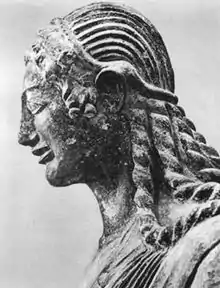List of English words of Etruscan origin
This is a list of English words that may be of Etruscan origin, and were borrowed through Latin, often via French. The Etruscan origin of most of these words is disputed, and some may be of Indo-European or other origin. The question is made more complex by the fact that the Etruscans borrowed many Greek words in modified form. Typically if a Latin word has an unknown, uncertain or disputed origin, it is considered a possible candidate for deriving in whole or in part from an Etruscan word; however, native Etruscan must then be distinguished from Greek. If no Etruscan word is clearly identifiable sometimes an attempt is made to reconstruct one. Etruscan derivations therefore are highly variable in probability; that is, some are highly speculative and others more likely.
List
- ace
- from Middle English aas, from Old French as, from Latin as, "a whole, a unit, copper coin", possibly Etruscan. As was a Roman coin and was also a unit of weight equal to about one troy pound.[1]
- antenna
- from antenna < antemna, "yard-arm, sail." Possibly Etruscan *antithemna > *ant(th)emna from Greek ανάτηθήμένος anatithēmenos, something set up.[2]
- arena
- from arēna "arena" < harēna, "arena, sand" < archaic hasēna < Sabine fasēna, unknown Etruscan word as the basis for fas- with Etruscan ending -ēna.[3]
- autumn
- from autumnus "autumn." Just as Etruscan veltha, an earth god, appears as Latin Vola or Olta and is in Voltumna and Vertumnus, so the parallel construction autumnus ought to come from Etruscan autu-, related to avil, "year": *av(i)-to-m(e)nos, with loss of the l. There are some names with both l and t: avlethaium, authnal, avtle, and so on, which appear related to autu or auta in Venetic, the idea being that autumn signifies the passing of the year.[4]
- belt
- from balteus, "sword belt." The sole connection between this word and Etruscan is a statement by Marcus Terentius Varro that it was of Etruscan origin. All else is speculation.[5]
- catamite
- Latin, from Etruscan catmite, from the Ancient Greek Ganymede, cupbearer to Zeus.
- ceremony
- possibly Etruscan or possibly referring to Etruscan rites performed at Caere.[6]
- defenestration, fenestra
- element
- from elementum, 'letter'.
- histrionic
- from histrionicus, from histrio, "actor".
- letter
- from Old French lettre, from Latin littera, which may have derived, via Etruscan, from the Greek "διφθέρα" (writing tablet).
- mantissa
- market
- military
- Etruscan or perhaps related to Greek homilos, "assembled crowd" (compare homily).[7]
- mundane
- from mundus, 'earth', from munth, 'land'.
- mutule
- palace, palate, palatine
- One of the seven hills of Rome. Either from Latin palus "stake" or the Etruscan shepherd goddess Pales.[8]
- people
- From Latin populus by way of Old French peuple, possibly of Etruscan origin.[9]
- person
- from Middle English persone, from Old French persone, from Latin persona, "mask", probably from Etruscan phersu, "mask".[10]
- Rome
- from 'Ruma', the name of one of the Etruscan tribes, or 'Rumon', which was what the Etruscans called the Tiber River, possibly of Etruscan origin
- satellite
- from Latin satelles, meaning "bodyguard, attendant", perhaps from Etruscan satnal.[11]
- scurrilous
- Serge (first name)
- serve
- the word serve derives from Latin servire ('to serve') and servus ('a slave'), which have sometimes been thought to derive from Etruscan.[12] However, a detailed analysis has preferred an Indo-European etymology for the Latin word.[13]
- spurious
- triumph
- From Old Latin triumpus, probably a loan word via Etruscan from Greek thriambos, a hymn to Dionysus.[14]
- vernacular
- from vernaculus, 'domestic', from verna, 'a native slave'.
- viburnum
References
- American Heritage Dictionary, New College Edition (1976), page 76
- Breyer (1993) pp. 174–175.
- Breyer (1993) p. 259.
- Breyer (1993) pp 412–413.
- Donaldson, John William (1852). Varronianus: A Critical and Historical Introduction to the Ethnography of Ancient Italy and to the Philological Study of the Latin Language (2 ed.). London, Cambridge: J. W. Parker & Son. p. 154. Breyer (1993) pp 428–429 reports on an attempt to bring in Hittite and Gothic connecting it with a totally speculative root *-lst-.
- "ceremony | Origin and meaning of ceremony by Online Etymology Dictionary". www.etymonline.com. Retrieved 26 December 2020.
- "military (adj.)", On Line Etymological Dictionary, http://www.etymonline.com/index.php?term=military&allowed_in_frame=0
- palace (n.), On Line Etymological Dictionary, http://www.etymonline.com/index.php?allowed_in_frame=0&search=palace&searchmode=none
- people (n.), On Line Etymological Dictionary, http://www.etymonline.com/index.php?allowed_in_frame=0&search=people&searchmode=none
- American Heritage Dictionary, New College Edition, page 978
- Amelia Carolina, Sparavigna (29 January 2016). "The Word Satellite, Its Origin From Etruscan And Its Translation Into Greek". philica.com. Retrieved 3 January 2018.
- E.g. Anna Kłosowska, 'The Etymology of Slave', in Disturbing Times: Medieval Pasts, Reimagined Futures, ed. by Catherine E. Karkov, Anna Kłosowska and Vincent W.J. van Gerven Oei (Earth, Milky Way: punctum, 2020), pp. 151-214 (p. 161).
- Thomas Wiedemann, review of H. Rix, Die Termini der Unfreiheit in den Sprachen Alt-Italiens, Forschungen zur antiken Sklaverei, 25 (Stuttgart: Steiner, 1994) ISBN 3515066160, in The Classical Review, 48.1 (April 1998), 227-28 (citing Rix pp. 86ff.).
- triumph (n.), On Line Etymological Dictionary, http://www.etymonline.com/index.php?term=triumph
Bibliography
- Breyer, Gertraud (1993). Etruskisches Sprachgut im Lateinischen unter Ausschluss des spezifisch onomastischen Bereiches (in German). Peeters Publishers. ISBN 9068313355. 9789068313352.
See also
- Lists of English words of international origin
